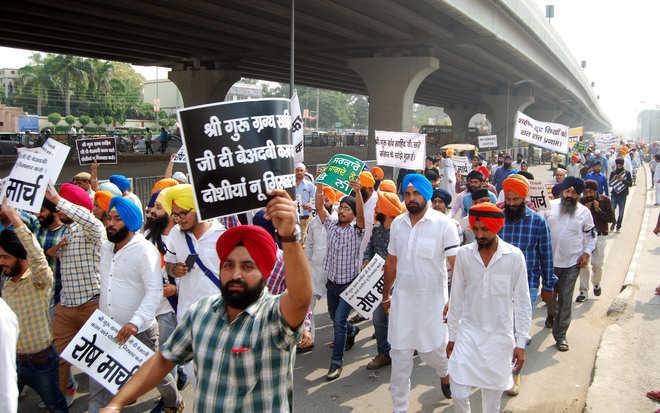AI Generated Summary
- Although the tangible impact of the sacrilege (or colloquially, ‘Beadbi’) incidents is difficult to measure, at least one political party, Shiromani Akali Dal (Badal), appears to have paid a high price for their inability to identify and punish those responsible for the sacrilege.
- Nearly eight years have passed since pages from the Guru Granth Sahib were discovered torn and scattered in the streets of a village called Burj Jawahar Singh Wala in the Faridkot district, but the anger over sacrilege issues continues to influence Punjab politics.
- Capitalizing on public anger against the incumbent Akali Dal government’s perceived inaction and failure to deliver justice, Congress emerged victorious, winning a majority and forming the government in Punjab.
Nearly eight years have passed since pages from the Guru Granth Sahib were discovered torn and scattered in the streets of a village called Burj Jawahar Singh Wala in the Faridkot district, but the anger over sacrilege issues continues to influence Punjab politics.
Although the tangible impact of the sacrilege (or colloquially, ‘Beadbi’) incidents is difficult to measure, at least one political party, Shiromani Akali Dal (Badal), appears to have paid a high price for their inability to identify and punish those responsible for the sacrilege.
Shift in Political Power
The 2017 Punjab Assembly elections were significantly influenced by the sacrilege incidents. Capitalizing on public anger against the incumbent Akali Dal government’s perceived inaction and failure to deliver justice, Congress emerged victorious, winning a majority and forming the government in Punjab. While the anti-incumbency factor undoubtedly played a role, political commentators often attribute the change in power to sacrilege issues.
Emergence of New Political Forces
The sacrilege incidents have also given rise to new political forces in Punjab. The Aam Aadmi Party (AAP) emerged as a strong contender in the 2017 elections, securing 20 seats in the Assembly. AAP’s focus on addressing sacrilege cases, corruption, and drug menace resonated with voters.
Impact on Alliances
Sacrilege incidents have had a lasting impact on political alliances in Punjab. The SAD-BJP alliance disintegrated in 2020 due to disagreements over farm laws. This breakup paved the way for new alliances, such as the Punjab Lok Congress (PLC) collaboration with the BJP and Akalis going with BSP.
Political Campaigns and Promises
Sacrilege cases have become an integral part of Punjab’s political narrative. Parties contesting the March 2022 Assembly elections incorporated the sacrilege issue into their manifestos, pledging swift justice in these cases. This made sacrilege a central issue in the political discourse in Punjab.
Elusive Justice
Approximately 280 sacrilege incidents have been reported in or around Punjab since 2015. While mobs or shooters have killed six sacrilege suspects, two protestors have also died in sacrilege-related violence. Successive state governments have established special investigation teams (SITs) and investigation commissions to deliver justice, but justice remains unattained.
The Sacrilege Issue as a Polarizing Factor
Sacrilege incidents have contributed to the polarisation of the electorate along religious or sectarian lines. Political parties have used these incidents to target opponents and gain sympathy from the Sikh community. This strategy can exacerbate Punjab’s religious divide, fostering an environment of mistrust and hatred.
The Sikh community experiences a sense of threat to their identity, which they perceive as being eroded by deviant youth (referred to as Patit within Panthic circles) who neglect religious tenets, self-styled Gurus and their Deras, and religious conversions. Beadabi, or the desecration of the Guru Granth Sahib (regarded as a living Guru), evokes strong emotions and provokes violent actions.
Conclusion
The shadows of sacrilege continue to loom over Punjab politics. The issue has not only altered the political landscape but also emphasized the importance of addressing the concerns of the Sikh community. As the state prepares for another election cycle, it remains to be seen how the sacrilege issue will shape the




